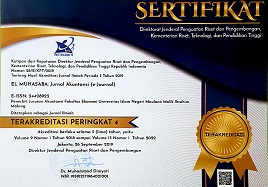MEMAKNAI IMPLEMENTASI CORPORATE SOCIAL RESPONSIBILITY MENUJU SUSTAINABILITY DALAM PERSPEKTIF SOCIAL PRACTICE BOURDIEU
Abstract
This study aims to interpret the implementation of CSR in achieving corporate sustainability studied with Bourdieu's social practice theory. This study uses an interpretive paradigm with a phenomenological approach. The research location is PT. Tirta Investama - Pasuruan Keboncandi Factory. Data collection was carried out by conducting in-depth interviews with key informants who took turns to obtain data triangulation.
The results showed that the implementation of CSR on the research site was well organized and structured and became a permanent and incidental program. CSR is implemented based on the principle of "dual commitment", which is the belief that if a company wants to be successful in business, the company must be successful socially. The process of defining and understanding CSR towards corporate sustainability is pursued by forming a habitus, maintaining the existence of capital and mastering the field, this is in line with Bourdieu's concept of social practice.
Keywords
Full Text:
PDFReferences
Aaken, D. van, Splitter, V., & Seidl, D. (2012). Why Do Corporate Actors Engage in Pro-Social Behavior? A Bourdieusian Perspective on Corporate Social Responsibility. SSRN Electronic Journal, 319. https://doi.org/10.2139/ssrn.1970618
Aguinis, H., & Glavas, A. (2012). What We Know and Don’t Know About Corporate Social Responsibility: A Review and Research Agenda. Journal of Management, 38(4), 932–968. https://doi.org/10.1177/0149206311436079
Alijani, S., & Karyotis, C. (2016). Finance and Economy for Society : Integrating Sustainability.
Antolín-López, R., Delgado-Ceballos, J., & Montiel, I. (2016). Deconstructing corporate sustainability: a comparison of different stakeholder metrics. Journal of Cleaner Production, 136, 5–17. https://doi.org/10.1016/j.jclepro.2016.01.111
Baumgartner, R. J. (2014). Managing corporate sustainability and CSR: A conceptual framework combining values, strategies and instruments contributing to sustainable development. Corporate Social Responsibility and Environmental Management, 21(5), 258–271. https://doi.org/10.1002/csr.1336
Bourdieu, P. (1983). The field of cultural production, or: The economic world reversed. Poetics, 12(4–5), 311–356. https://doi.org/10.1016/0304-422X(83)90012-8
Bourdieu, P. (1985). The social space and the genesis of groups. Theory and Society, 14(6). https://doi.org/10.1007/BF00174048
Bowen, H. R. (2018). Why Are Businessmen Concerned About Their Social Responsibilities? (Continued). Social Responsibilities of the Businessman, 15(1), 84–105. https://doi.org/10.2307/j.ctt20q1w8f.14
Bruch, H., & Walter, F. (2005). The keys to rethinking corporate philanthropy. MIT Sloan Management Review, 47(1).
Burke, L., & Logsdon, J. M. (1996). How Corporate Social Responsibility Pays Off. Long Range Planning, 29(4), 495–502. https://doi.org/10.1016/0024-6301(96)00041-6
Carroll, A. B. (1999). Corporate social responsibility: Evolution of a definitional construct. Business and Society, 38(3), 268–295. https://doi.org/10.1177/000765039903800303
Chen, C. H., & Wongsurawat, W. (2011). Core constructs of corporate social responsibility: A path analysis. Asia-Pacific Journal of Business Administration, 3(1), 47–61. https://doi.org/10.1108/17574321111116397
Clara C. Romero, K., & L. Lamadrid, R. (2014). Rethinking corporate social responsibility within the sustainability agenda. Journal of Global Responsibility, 5(2), 180–202. https://doi.org/10.1108/jgr-06-2014-0023
Creswell, J. W. (2007). Qualitative Inquiry and Research Design: Choosing Among Five Approaches. In Sage Publication: Vol. 2nd editio. https://doi.org/10.1177/1524839915580941
Creswell, J. W. (2009). Research design - Qualitative, Quantitative and Mixed Method Approach. In Sage Publication: Vol. third edit. https://doi.org/10.2307/1523157
Freeman, R. E. E., & McVea, J. (2005). A Stakeholder Approach to Strategic Management. SSRN Electronic Journal, January. https://doi.org/10.2139/ssrn.263511
George Ritzer-Douglas J. Goodman. (2005). Teori Sosiologi Moderen.
Griffin, P. A., & Sun, E. Y. (2018). Voluntary corporate social responsibility disclosure and religion. Sustainability Accounting, Management and Policy Journal, 9(1), 63–94. https://doi.org/10.1108/SAMPJ-02-2017-0014
Handayati, P., Rochayatun, S., Soetjipto, B. E., Sudarmiatin, Suharto, & Bukhori, I. (2017). Dismantling social romanticism for corporate social responsibility. International Journal of Applied Business and Economic Research, 15(19).
Hidayah, R., & Khafid, M. (2016). A Critical Review on Concept Developments of Corporate Social Responsibility Implementation in Enterprises. Review of Integrative Business and Economics Research, 5(1), 340–345.
Hobsbawm, E. (2016). Pierre bourdieu. In New Left Review (Issue 101). https://doi.org/10.15845/praxeologi.v3i0.3158
Huda, M., Mulyadi, D., Hananto, A. L., Nor Muhamad, N. H., Mat Teh, K. S., & Don, A. G. (2018). Empowering corporate social responsibility (CSR): insights from service learning. Social Responsibility Journal, 14(4), 875–894. https://doi.org/10.1108/SRJ-04-2017-0078
Jenkins, R. (1992). Pierre Bourdieu: Key Sociologists. In Routledge: London
Krisdinanto, N. (2016). Pierre Bourdieu, Sang Juru Damai. KANAL: Jurnal Ilmu Komunikasi, 2(2), 189. https://doi.org/10.21070/kanal.v2i2.300
Marrewijk, M. Van. (2003). Concepts and definitions of CSR and corporate sustainability: Between agency and communion. Journal of Business Ethics, 44, 95–105.
Matten, D., & Moon, J. (2008). “Implicit” and “explicit” CSR: A conceptual framework for a comparative understanding of corporate social responsibility. Academy of Management Review, 33(2), 404–424. https://doi.org/10.5465/AMR.2008.31193458
McWilliams, A., & Siegel, D. (2000). Corporate social responsibility and financial performance: Correlation or misspecification? Strategic Management Journal, 21(5). https://doi.org/10.1002/(SICI)1097-0266(200005)21:5<603::AID-SMJ101>3.0.CO;2-3
McWilliams, A., & Siegel, D. S. (2011). Creating and capturing value: Strategic corporate social responsibility, resource-based theory, and sustainable competitive advantage. Journal of Management, 37(5), 1480–1495. https://doi.org/10.1177/0149206310385696
Moura-Leite, R. C., & Padgett, R. C. (2011). Historical background of corporate social responsibility. Social Responsibility Journal, 7(4), 528–539. https://doi.org/10.1108/1747111111117511
Perrini, F., Russo, A., & Tencati, A. (2007). CSR strategies of SMEs and large firms. Evidence from Italy. Journal of Business Ethics, 74(3), 285–300. https://doi.org/10.1007/s10551-006-9235-x
Pomare, C. (2018). A multiple framework approach to sustainable development goals (SDGs) and entrepreneurship. Contemporary Issues in Entrepreneurship Research, 8, 11–31. https://doi.org/10.1108/S2040-724620180000008006
Russo, A., & Perrini, F. (2010). Investigating stakeholder theory and social capital: CSR in large firms and SMEs. Journal of Business Ethics, 91(2), 207–221. https://doi.org/10.1007/s10551-009-0079-z
Schaltegger, S., Bennett, M., & Burrit, R. (2006). Corporate Sustainability – the Basis of Sustainability Accounting and Reporting. In Sustainability Accounting and Reporting.
Spence, L. J. (2007). CSR and Small Business in a European Policy Context : The Five “C” s of CSR anf Small Business Research. Science & Sports, 22(3–4), 184–185. https://doi.org/10.1016/j.scispo.2007.06.005
Wapshott, R. (2017). Pierre Bourdieu, Organisation, and Management. Personnel Review, 46(2), 449–450. https://doi.org/10.1108/pr-08-2016-0203
Webb, J., Schirato, T., & Danaher, G. (2020). Understanding Bourdieu. Understanding Bourdieu, 1–210. https://doi.org/10.4324/9781003118305
DOI: https://doi.org/10.18860/em.v12i2.12010
Refbacks
- There are currently no refbacks.
Editorial Office:
Megawati Soekarnoputri Building
Accounting Department, Faculty of Economics
Jln. Gajayana 50 Telp (0341) 558881
E-mail: elmuhasaba@uin-malang.ac.id
Universitas Islam Negeri Maulana Malik Ibrahim Malang
E-ISSN 2442-8922
P-ISSN 2086-1249

This work is licensed under a CC BY SA 4.0 International License


















